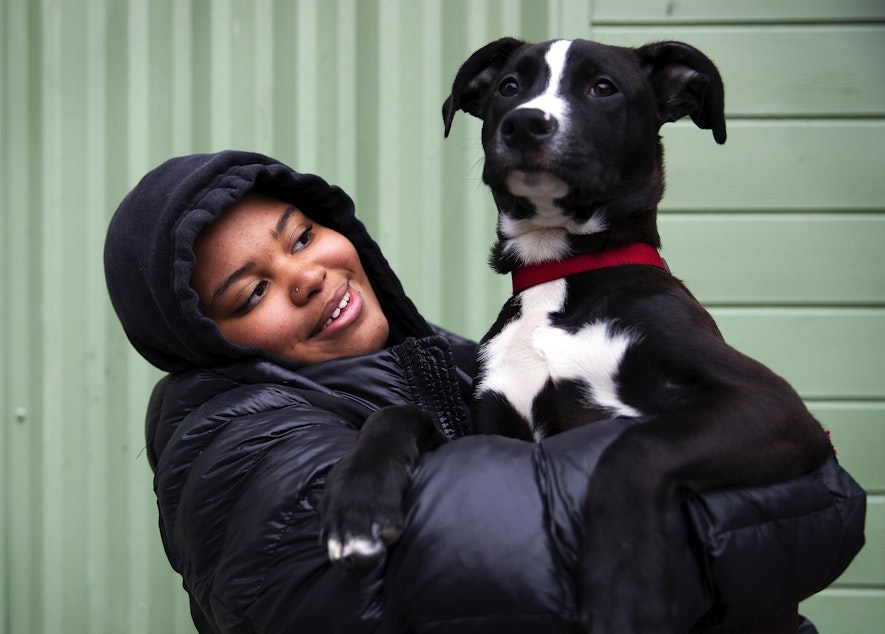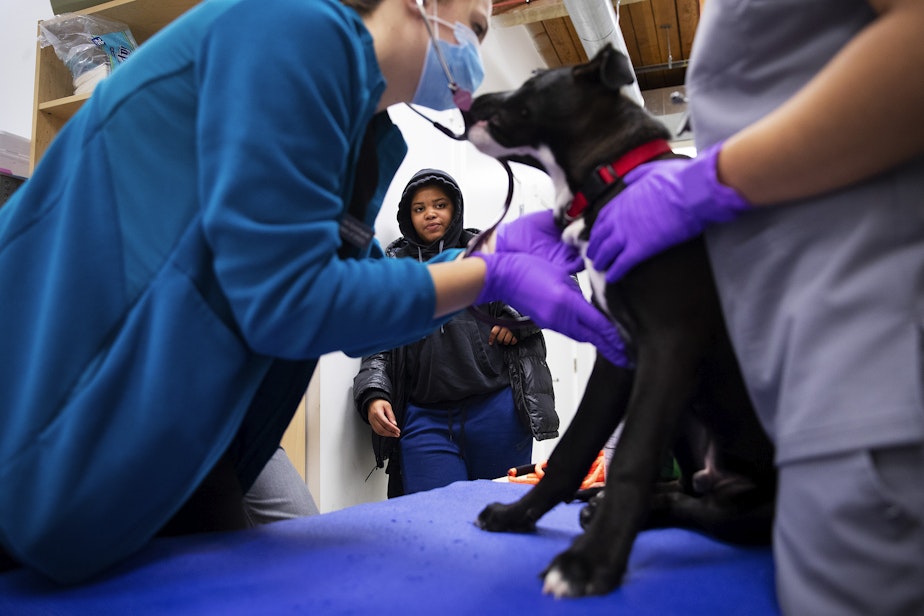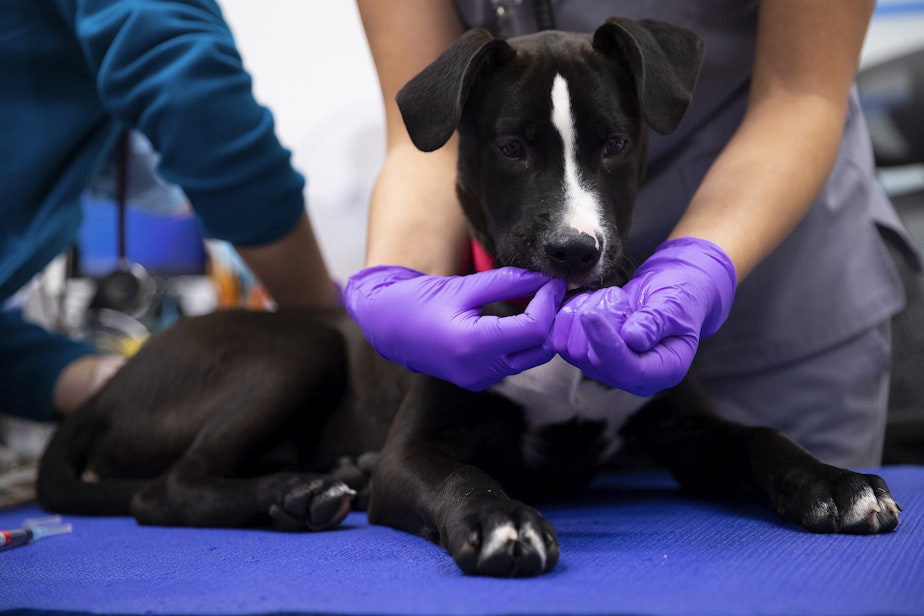How do you get a homeless young person into a clinic? Treat their pet

At the New Horizons youth homeless shelter in Belltown, there are rooms for up to 30 youth and young adults to spend the night. And right in the middle of those is a vet clinic, where on a recent Wednesday afternoon the 5-month-old puppy Rico got tagged and had his first vaccines and a deworming pill.
Rico’s owner, 19-year-old Lisa Fortune, lived at the shelter for nine months. Now she has a studio apartment, but she still brings her two cats — and Rico — to the shelter's vet clinic for their care.
“I deal with depression a lot, so it’s always good to have an animal little buddy nearby,” Fortune said.
The One Health Clinic has found an innovative way to bring more people in for health care – by offering care not just for them, but for their pets as well. This approach can help young people open up about their health needs and get treatment. That’s a crucial first step towards finding a stable job and stable housing.
“After you get your animal checked out, you know, there’s always a nice lady to speak with about just your personal health and stuff like that,” Fortune said. “‘Do you need anything? Do you want to get tested for this or that?’ Just a good person to talk to if you need anything as far as health and counseling and all of that.”

Sponsored
More than half of homeless youth and young adults in King County are dealing with depression or another major psychiatric diagnosis.
And without mental health care, about half of homeless youth can’t get out of homelessness and become chronically homeless adults, because mental health is so critical for stable employment and forming safe interpersonal relationships.
Other big needs are sexual and reproductive health care, and treatment for substance use disorders. And about a quarter of homeless youth in King County are LGBTQ and often need gender-affirming care.
But a big thing that gets people in the door is their animals’ needs. There’s been a health clinic in this shelter since it opened in 2016. But after vet services were added two years later, more teens and young adults started coming in. The clinic’s patients increased by 42%.
Dr. Katie Kuehl, the vet, said people often relax and start to open up while she’s treating their pets.
Sponsored
“People love talking about their pets,” she said. “And as they're talking about their pets, they'll oftentimes bring up all kinds of other things that are going on in their lives or with themselves, or their own health or well-being.”
What happens after the vet appointment is really key. A provider jumps in and asks the pet parent if they have any concerns about their own health.
After Rico’s visit was over, a nurse practitioner pulled Lisa Fortune aside, telling her she wanted to check in.
“They know some of your history,” Fortune explained. “They always check in and keep track of, ‘Do you still want this done? Would you like help with this?’ So I really enjoy talking to her.”
Getting patients to come — and keep coming back — is exactly what the clinic staff is going for.
Sponsored

Another aspect of this care model that makes it work is how the primary care team and the vet exchange notes, so they can see a fuller picture of someone’s health.
One time, for example, Dr. Kuehl was treating a cat with cancer and wanted to prescribe opioids for its pain. But the doctor told her that wasn’t a good idea: The owner was recovering from an opioid addiction.
“We treat the human and the animal,” said Anina Terry, the clinic’s medical director and a nurse practitioner with Neighborcare Health, which runs this clinic.
She said talking about her patients’ pets can offer a door into talking about mental health.
Sponsored
“Instead of saying to a patient, ‘Do you have a history of depression and anxiety?’ To be like, ‘Tell me about this animal. What do they mean to you? And how do they support you in day-to-day life?’” Terry said. “It can be an easy way to talk about past trauma or PTSD, anxiety, insomnia, aggression.”
Sponsored
And sometimes, Terry said, humans project their own mental health care needs onto their pets.
“They'll come to the veterinarian saying, ‘Bob really can't sleep at night, and Bob's really anxious,’” Terry said. “And you look at Bob, and Bob is like the most chill lab at an advanced age. And you’re like, ‘Well, that's interesting. I think the human is really having trouble sleeping and the human is having anxiety.’”
The biggest limitation of this model is that it takes a lot of time and resources to establish these relationships and build trust. The clinic is held twice a month for two and a half hours — and on a busy day, they only see eight human/animal pairs.
But, overall, the longer-term payoff has been so successful in this youth shelter that in August, Neighborcare Health started holding weekly clinics at Doney Coe Pet Clinic, an existing vet clinic for low-income and homeless families in downtown Seattle.
And an organization in New York City is borrowing the model and opening a combined pet and human clinic there in January.


